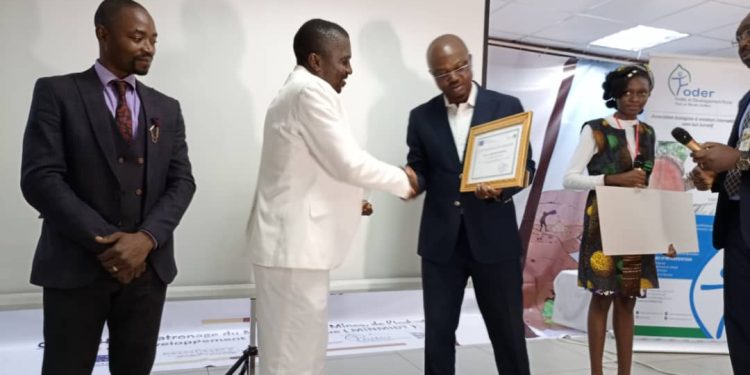Culled from The Guardian Post, Story By Doh Bertrand Nua
Tembang was declared first winner in the print category of the Mining Story Awards, whose results were announced by members of the jury Friday January 20.
The award is organised by a non-profit and internationally oriented environmental association, Forest and Rural Development, FODER, in collaboration with the European Union, EU.
Results of the competition were proclaimed on the sidelines of the Forum on Mining Governance, FGM 2023, which held in Yaounde.
The forum, which was under the patronage of the ministry of mines, industry and technological development, MINMIDT, was on the theme: “Artisanal and small-scale mining: opportunities and challenges for local development”.
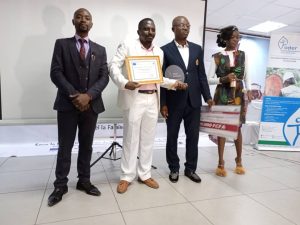
Declaring the results of the competition that saw the submission of investigative reports from journalists of the print, online, radio and television, the representative of the head of the jury, hailed the quality of the reports.
He said the jury received so many quality investigative reports on the mining sector in the country, but they had to do their objective evaluation after which only the best reports were retained for the awards in the various categories.
The representative of the head of the jury said their stories were evaluated objectively without any favouritism.
He particularly hailed the quality of Tembang’s investigative piece which was titled: “How Illegal Chinese Mining Destroys Livelihoods, Fuels Conflicts in Cameroon”, and saluted the reporter’s mastery of the domain and painting a vivid picture of the goings on in the sector.
Dedicates award to victims of Chinese mining
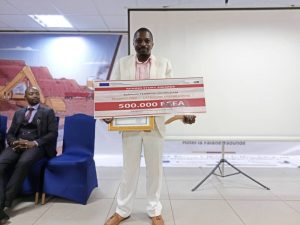
Solomon Tembang told reporters after receiving the award that he feels “elated that the jury judged” his “investigative news story as the best entry in the print category of the Mining Story Award”.
“I dedicate this award to all those who have lost their lives in mines in the East region in particular and other regions. I also dedicate it to other people whose livelihoods have been disrupted by Chinese mining in the East region,” he said.
Tembang, who has practiced for closed to two decades, with stints in many media organs, said the award will go a long way to spur him to “do more investigative stories, not only in the mining sector or extractive industries”.
Tembang, who is noted for writing investigative pieces said aside extractive industries, he plans to do more investigative pieces in other areas such as “health, politics, conservation, agriculture, water and sanitation, women and land rights, climate change, technology, digital rights, economy, human rights, conflict, peace-building, and global developments”.
Snippet of Tembang’s award-winning report
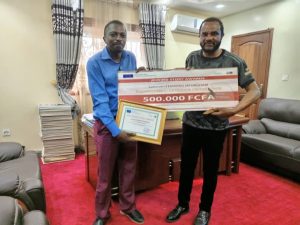
Tembang’s award-winning investigative report zoomed on how illegal Chinese mining has destroyed livelihoods and fuelled conflicts within the country.
The reporter hinged his article on the challenges faced by inhabitants of Longa Mali village of Betare Oya Subdivision, some 200 kilometres from Bertoua, the East regional capital.
In the piece, Tembang captures the difficulties faced by Nagbayanga Valentin, a widow in her late thirties, egging a life out of destitution with her four young children in Haya Haya, a mining encampment with about 2,000 inhabitants after her husband, Issa Paul, was shot dead by a Chinese whom the locals simply knew as Bouboul, in the course of a scuffle over a mining pit.
The piece also throws light on the ensuing conflicts within mining communities caused by Chinese miners brandishing mining concession on their land they inherited from their forefathers in accord with local traditional law.
Locals are also irked by the devastation of their environment by Chinese miners through semi-mechanised mining with the use of excavators and powerful pumps, leaving behind holes that are not covered, now posing as deathtraps for locals.
The foreigners had come to the area to begin the semi-mechanised mining in the East region in early 2000 when the Cameroon government was planning to build the Lom Panga hydroelectric dam because government had realised that a lot of gold would be lost in the area that was going to be flooded by the dam and so set up what was christened “Programme to Save Gold in Lom Panga Dam Area”.
The piece also zooms into the misery of locals as millions of FCFA are being mined away in gold, leaving behind the inhabitants to live in abject poverty and lack the most basic of social amenities.
It should be recalled that in 2019, the same report had been shortlisted in the Outstanding Investigative Reporting Category of an international journalism award, Fetisov Journalism Award.
Other laureates of Mining Story Awards
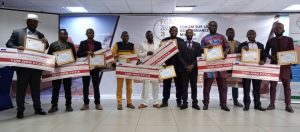
The laureates in each of the categories, it should be said, each bagged home an award, an award certificate and cash prizes ranging from 500,000 FCFA for first prize winners, 200,000 FCFA for second prize winners and 100, 000 FCFA for the third prize winners.
In the print category, Gibrile Kenfack Tsabdo of Cameroon Business Today won the second prize while Steve Libam of Cameroon Tribune bagged home the third prize.
In the online category, Jean Charles Biyo’o Ella of Reporterre.net won the first prize, Julien Chongwang of SCIDEV.net bagged home the second prize. The third prize was won by the former Desk Editor of The Guardian Post, Amindeh Blaise Atabong.
In the broadcast category, Ebenezer Diki and Boris Ngounou, both of RTS, won the first and second prizes respectively while under Television, Marcelin Ngansop of Equinoxe TV, Michael Menga of Hémisphère and Clavers Pascal Ndanga of CRTV respectively won the first, second and third prizes.
